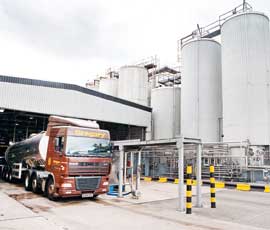Rest of Europe leads the way with farm co-ops

The UK continues to lag behind other European countries in terms of its agricultural co-operatives, according to a new report.
Just four UK co-ops, collectively representing 1% of the total €195bn turnover, made it into the European Agribusiness Co-operative top 100, compiled by Dutch consultant Co-op Champions.
Three of these were the dairy co-ops Milk Link, First Milk and Belfast-based United Dairy Farmers, while Northern Ireland food and feed processor Fane Valley also made the list, which ranked co-ops by turnover.
The UK’s performance was in contrast to France, which was represented by 29 co-ops generating a quarter of the top 100’s total turnover; Germany with 15 co-ops and 19% of turnover; and the Netherlands with 11 co-ops and 18% of total turnover.
Across the top 100, dairy co-operatives were the biggest sector in terms of both the number and revenue share, with Dutch milk processor FrieslandCampina ranked number one in the list, according to author Onno van Bekkum.
The supply and marketing sector generally had the largest co-ops, while arable co-ops were also strong, particularly when (mainly French) multi-purpose co-operatives were included, he added.
“The meat industry is still quite strong in this list, although the number of ‘pure’ co-operatives in this sector is clearly declining. The meat sector appears to be a difficult one in terms of co-operation.” Despite that, Dutch meat processor Vion was ranked second in the list.
Positive signs
Sion Roberts, senior partner at consultancy European Food and Farming Partnerships, said the findings were to be expected, given the historically strong performance of co-ops elsewhere in Europe. “It’s positive to see that at least four UK co-ops are in the list. The milk co-ops are very important to the sector and are making good steps forward.
“It’s worth noting that there are a number of good medium-sized businesses that are just off the list, such as farm inputs suppliers Anglia Farmers and AtlasFram, and grain co-op Openfield.”
Mr Roberts said UK co-ops were growing and could not afford to stand still, as European co-ops were developing into larger international businesses. The likes of Arla, Vion, Limagrain and New Zealand co-op Fonterra had all grown considerably and had moved into the UK, he said. Asian investors were also increasingly looking to European markets, he noted.
“It’s important our co-ops continue to develop, but our industry is structured differently to those elsewhere in Europe and more collaborative ventures will be needed. Opportunities may exist to work with some of these big co-ops, but the challenge will be how they work with our farmers.
“If you’re not going to own the supply chain, then the important thing is to develop strong relationships within it,” he added.
European Agri Co-op top 100 highlights
| Rank | Company | Country | Turnover (£m) |
|---|---|---|---|
| 1 | Friesland Campina | Netherlands | 9,626 |
| 2 | Vion Food | Netherlands | 8,870 |
| 4 | Arla Foods | Denmark | 7,384 |
| 5 | Danish Crown | Denmark | 6,954 |
| 20 | Glanbia | Ireland | 2,735 |
| 33 | Irish Dairy Board | Ireland | 1,905 |
| 69 | Milk Link | GB | 666 |
| 71 | First Milk | GB | 652 |
| 94 | United Dairy Farmers | NI | 455 |
| 100 | Fane Valley | NI | 431 |
Efficiency drive at Arla
Arla has announced a significant restructuring of its internal operations in order to cut DKr500m (£54m) from annual costs.
Some 150 administrative positions will be affected, and the Danish co-op will also cut spending on research and packaging in a bid to keep up with international competitors and ensure a competitive milk price to co-operative owners.
“We have a responsibility towards all of our co-operative owners and other dairy farmers, who invest their milk and their money in Arla, to make sure that our turnover grows significantly faster than our cost,” chief executive Peder Tuborgh said. “Our international competitors are able to turn ideas into action quicker than before and, therefore, Arla needs a more simple and structured way of working.”
